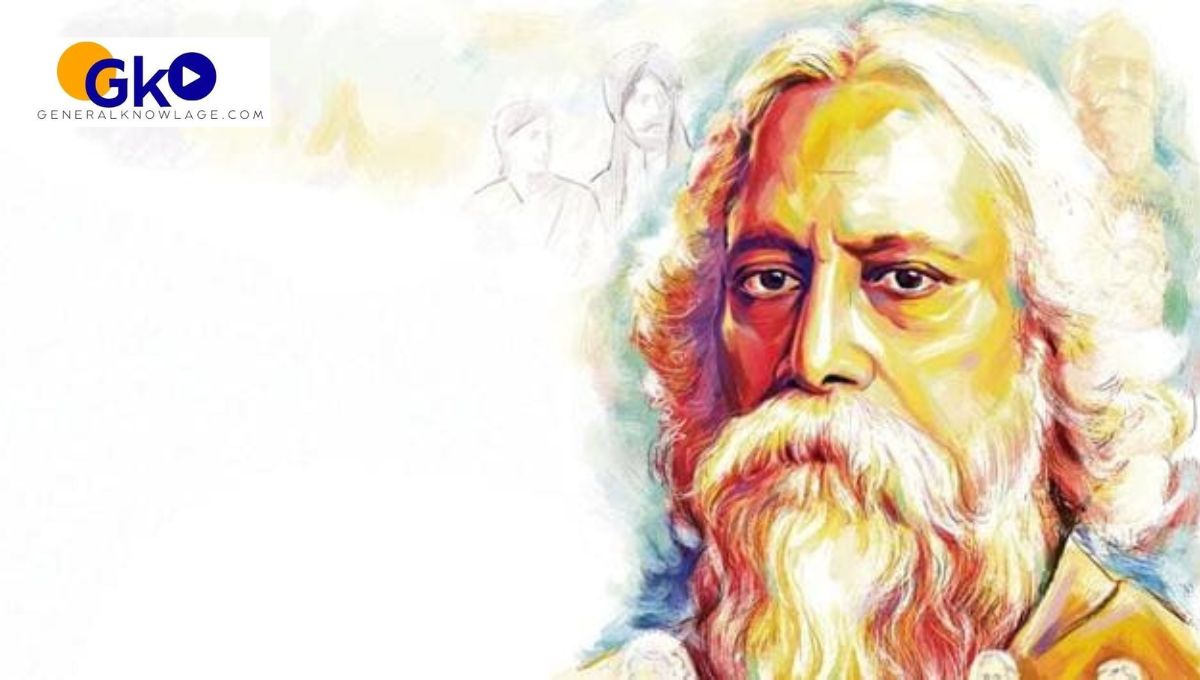Rabindranath Tagore Biography in English Short Note, Wikipedia, Summary, Family, Wife, Indore
Rabindranath Tagore Biography in English Short Note, Wikipedia, Summary, Family, Wife, Indore – Rabindranath Tagore, born on May 7, 1861, in Kolkata, India, was a versatile genius known for his contributions to literature, music, art, and education. Hailing from Bengal, he broke traditional norms in Bengali literature, introducing fresh styles and themes that bridged Indian and Western cultures. In 1913, he made history as the first non-European to win the Nobel Prize in Literature, solidifying his position as a towering figure in the literary world. Tagore’s influence continues to resonate globally, showcasing the enduring impact of his multifaceted talents.
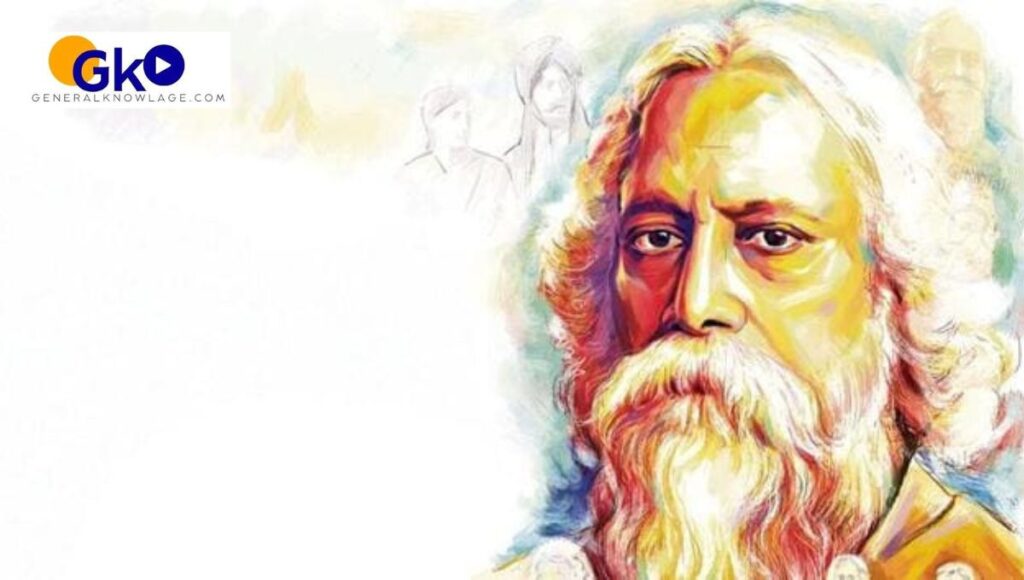
Rabindranath Tagore Early Life
Rabindranath Tagore’s early years were shaped by the cultural and intellectual environment of his family in Kolkata. Born into a distinguished household on May 7, 1861, Tagore was the youngest of thirteen children. His father, Debendranath Tagore, a prominent philosopher, and his mother, Sarada Devi, deeply involved in cultural activities, provided a nurturing atmosphere for his development. Tagore’s upbringing immersed him in literature, music, and art from an early age, laying the foundation for his future creative endeavors.
| Born | 7 May, 1861 |
| Place of Birth | Calcutta, British India |
| Penname | Bhanu Singha Thakur (Bhonita) |
| Died | 7 August, 1941 |
| Place of Death | Calcutta, British India |
| Award | Nobel Prize in Literature (1913) |
| Title | Bard of Bengal |
Rabindranath Tagore Education
Tagore’s education took both conventional and unconventional paths. Despite being sent to England for schooling with the intent of pursuing a legal career, he displayed little interest in traditional academic pursuits. Instead, Tagore’s time abroad was marked by his independent exploration of literature and the arts. His passion for Shakespearean plays and his immersion in English, Irish, and Scottish literature greatly influenced his artistic development.
Rabindranath Tagore Family Background
Rabindranath Tagore was born into a distinguished family in Kolkata, with his father, Debendranath Tagore, being a renowned philosopher and his mother, Sarada Devi, actively engaged in cultural and social activities. Tagore’s family background provided him with a rich cultural and intellectual upbringing, nurturing his early interests in literature, music, and art.
| Father | Debendranath Tagore |
| Mother | Sarada Devi |
Rabindranath Tagore Relationship
Tagore’s personal life included his marriage to Mrinalini Devi, with whom he had five children. Though less discussed compared to his literary achievements, his family life was an integral part of his personal journey and provided him with support and companionship throughout his life.
| Spouse | Mrinalini Devi |
| Children | Renuka Tagore, Meera Tagore, Rathindranath Tagore, Shamindranath Tagore, and Madhurilata Tagore |
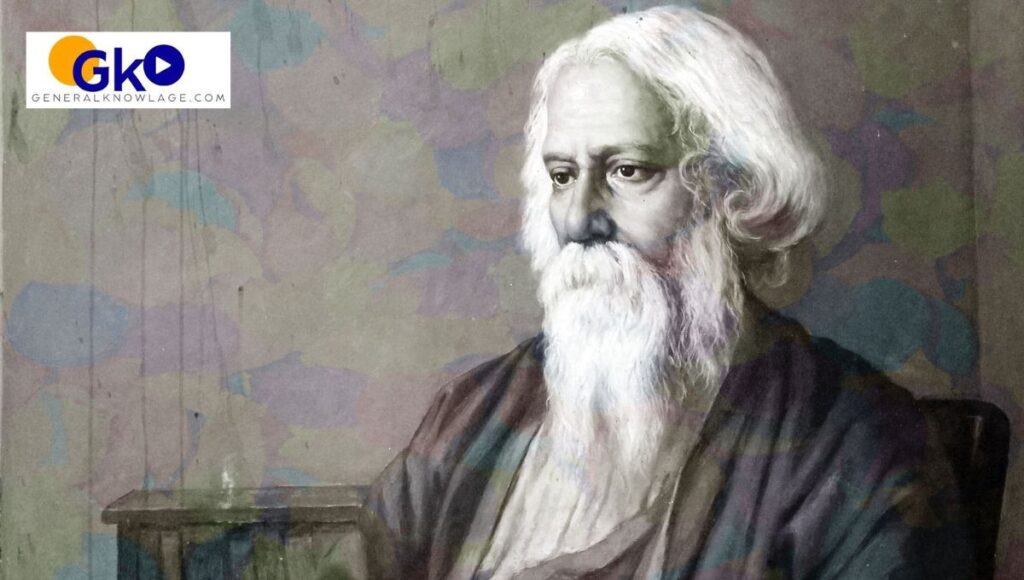
Rabindranath Tagore Career
Rabindranath Tagore’s career was as expansive as it was illustrious, marked by a relentless pursuit of artistic expression across various mediums. Emerging as a poet in his adolescence, he quickly gained recognition for his evocative verses, which breathed new life into Bengali literature. His early collections, such as “Kabi Kahini” (Tales of a Poet), hinted at the depth of his poetic sensibilities. Tagore’s literary prowess extended beyond poetry, encompassing a wide array of genres including prose, fiction, drama, and painting. His novels, such as “Gora” and “Ghare-Baire” (The Home and the World), are hailed for their psychological depth and exploration of complex social themes. As a playwright, Tagore crafted works like “Chitra” and “Dak Ghar” (The Post Office), showcasing his ability to dissect societal norms and human relationships with profound insight. Tagore’s career was a testament to his boundless creativity and his unwavering commitment to pushing artistic boundaries.
Rabindranath Tagore At Shantiniketan
Tagore’s association with Shantiniketan marked a significant chapter in his life. Established in 1901, Shantiniketan became a center for learning, creativity, and cultural exchange under his guidance. Tagore’s vision for education emphasized a holistic approach that harmonized nature, arts, and intellectual pursuits, breaking away from traditional educational norms.
Rabindranath Tagore Nationalism
Rabindranath Tagore’s thoughts on nationalism reflected a deep-seated concern for the broader human condition. While he fervently advocated for India’s cultural and spiritual resurgence, he cautioned against the pitfalls of narrow nationalism. In his seminal work “Nationalism,” Tagore articulated a vision of inclusivity and mutual understanding, warning against the divisive forces that threatened to undermine the fabric of society. He emphasized the importance of transcending parochial boundaries and cultivating a sense of universal brotherhood. Tagore’s nuanced perspective on nationalism, rooted in humanism and empathy, continues to resonate in an increasingly interconnected world, offering a timeless lesson on the enduring value of unity amidst diversity.
Rabindranath Tagore Literary Works
Rabindranath Tagore’s literary oeuvre stands as a testament to his unparalleled genius and his profound understanding of the human condition. His poetry, particularly exemplified in the timeless verses of “Gitanjali” (Song Offerings), transcends linguistic and cultural barriers, offering solace and inspiration to readers across the globe. Tagore’s prose writings, ranging from essays to short stories, are characterized by their keen observations of society and their exploration of existential themes. Works like “Galpaguchchha” (Bunch of Stories) capture the essence of everyday life in Bengal, illuminating the human experience with rare poignancy. As a novelist, Tagore delved into the intricacies of human relationships and the clash between tradition and modernity, weaving tales that resonate with timeless relevance. His plays, imbued with a deep sense of social consciousness, serve as a mirror to society, challenging conventions and provoking thought. Through his literary works, Tagore not only enriched Bengali literature but also left an indelible mark on the global literary landscape, earning him the distinction of being one of the greatest literary figures of the twentieth century.
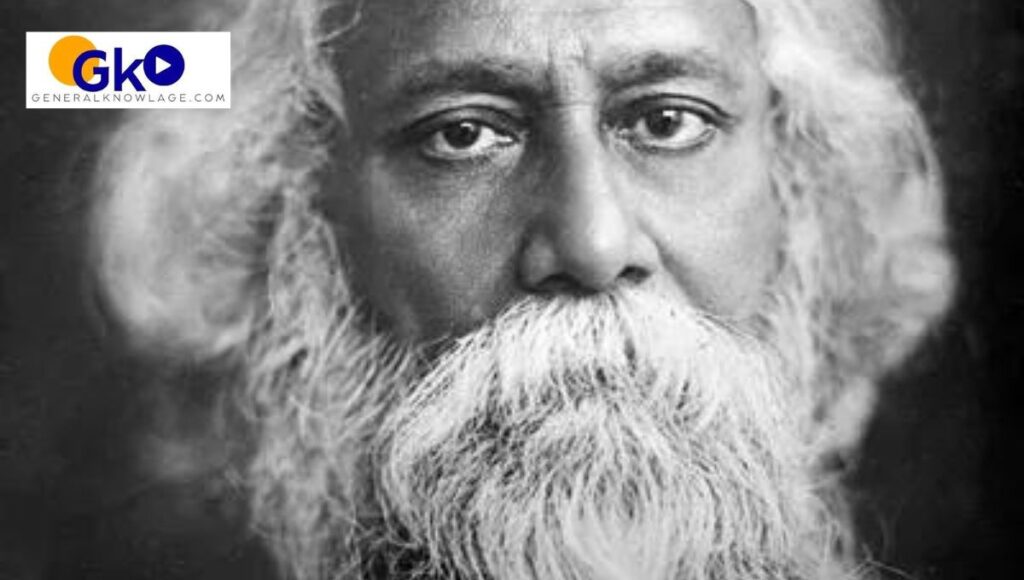
Rabindranath Tagore Awards
Tagore’s prolific contributions to literature earned him numerous awards and honors, including the Nobel Prize in Literature in 1913. He was also knighted by the British Crown and received recognition for his cultural contributions from various institutions, solidifying his status as a literary luminary.
Rabindranath Tagore Death
Rabindranath Tagore passed away on August 7, 1941, in Kolkata, leaving behind a legacy that continues to inspire generations. His contributions to literature, arts, and philosophy remain as vibrant and impactful as ever, ensuring that his influence lives on through his works and the institutions he founded.
Rabindranath Tagore Legacy
Tagore’s legacy is profound and enduring, encompassing literature, music, art, education, and cultural exchange. His contributions have left an indelible mark on India and the world, shaping the course of thought, creativity, and social change. Tagore’s profound insights into human nature, spirituality, and the interconnectedness of all life continue to inspire and resonate globally.
Rabindranath Tagore Biography in English project
Rabindranath Tagore, born on May 7, 1861, in Kolkata, India, was a polymath whose profound contributions to literature, music, art, and education earned him global acclaim. Hailing from Bengal, Tagore emerged as a literary prodigy in his youth, publishing his first collection of poems, “Kabi Kahini” (Tales of a Poet), at the tender age of sixteen. His poetic prowess blossomed into full brilliance with works like “Gitanjali” (Song Offerings), which earned him the Nobel Prize in Literature in 1913, making him the first non-European to receive the honor.
Tagore’s literary genius extended beyond poetry to encompass novels, short stories, essays, and plays. His novels, including “Gora” and “Ghare-Baire” (The Home and the World), showcased his keen insight into human nature and societal dynamics, while his short stories, compiled in “Galpaguchchha” (Bunch of Stories), captured the essence of everyday life in Bengal with rare poignancy.
In addition to his literary endeavors, Tagore was a prolific composer, painter, and playwright. His musical compositions, known as Rabindrasangeet, are integral to Bengali culture, blending poetry with melody to create timeless masterpieces. As a painter, Tagore’s works reflected his unique perspective on life, nature, and spirituality, earning him recognition as a prominent artist of his time.
Tagore’s commitment to education led him to establish Shantiniketan in 1901, a progressive educational institution that emphasized a holistic approach to learning. Under his guidance, Shantiniketan became a hub of creativity, cultural exchange, and intellectual pursuit, attracting scholars and students from around the world.
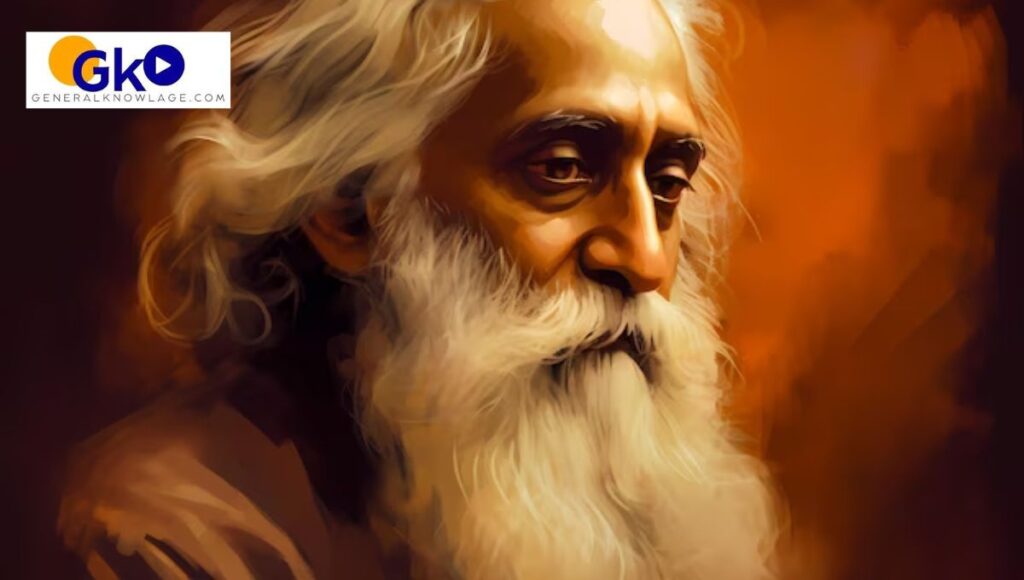
Throughout his life, Tagore’s vision extended beyond national boundaries, advocating for universal humanism and cultural exchange. His views on nationalism, articulated in works like “Nationalism,” emphasized inclusivity and mutual understanding, challenging divisive ideologies.
Rabindranath Tagore’s legacy endures as a beacon of artistic excellence, cultural enrichment, and educational innovation, inspiring generations to come with his timeless wisdom and boundless creativity.
Rabindranath Tagore Facts
- Tagore was the first non-European to win the Nobel Prize in Literature.
- He composed the national anthems of India and Bangladesh.
- Tagore’s works are translated into many languages and continue to inspire people worldwide.
Conclusion
Rabindranath Tagore’s life and work exemplify the transformative power of art and ideas. His legacy as a poet, writer, composer, and educator continues to enrich humanity, transcending geographical and cultural boundaries. Tagore’s profound insights into human nature, spirituality, and the interconnectedness of all life remind us of the enduring value of creativity and intellectual pursuit.
Also, Read
- Andrew Novak Wikipedia, Wiki, Earning, Wife, Age, Children, Net Worth
- Karoline Leavitt Engaged, Husband, Twitter, Wikipedia, Height, Fiance, family, Parents, Biography, Birthday
- Jay Chang Ethnicity, Age, Twitter, Debut, Twitter, Tiktok
What was Rabindranath Tagore famous for?
Rabindranath Tagore, born in 1861, was widely known as a poet. He made history in 1913 by becoming the first non-European to win the Nobel Prize for Literature.
Is Rabindranath Tagore a freedom fighter?
Yes, Rabindranath Tagore, born in Kolkata, West Bengal, was not only a poet and writer but also actively participated in the national freedom struggle, contributing significantly to India’s fight for independence.
When Rabindranath Tagore died and why?
Rabindranath Tagore passed away on August 7, 1941, at the age of 80. He suffered from severe health issues, including uraemia and a blocked urinary bladder. Doctors recommended surgery, which Tagore reluctantly underwent on July 30, 1941.
Where did Tagore die?
Rabindranath Tagore breathed his last at Jorasanko Thakurbari, located in Kolkata, the city where he was born and spent much of his life.
What did Rabindranath Tagore love?
Rabindranath Tagore developed a deep affection for his wife, Mrinalini. Despite their love, their time together was short-lived as Mrinalini passed away at a young age of 29. In her memory, Tagore wrote and published a collection of 27 poems titled “Smaran” (Remembrance).

